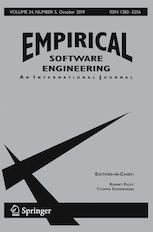Empirical Software Engineering - An International Journal
Editor-in-Chief: Robert Feldt; Thomas Zimmermann
ISSN: 1382-3256 (print version)
ISSN: 1573-7616 (electronic version)
Journal no. 10664
Facebook: facebook.com/emsejournal
Twitter: @emsejournal

Call for Papers
Human-Centered AI for Software Engineering (HumanAISE)
A special issue of the Empirical Software Engineering Journal. http://www.springer.com/computer/swe/journal/10664
Editors of the Special Issue
- Yu Huang, Vanderbilt University, USA
- Tianyi Zhang, Purdue University, USA
- John Grundy, Monash University, Australia
- David Lo, Singapore Management University, Singapore
- Daniel Russo, Aalborg University, Denmark
- Thomas Zimmermann, University of California, Irvine, USA
Contact Person
- Yu Huang yu.huang@vanderbilt.edu
- Tianyi Zhang tianyi@purdue.edu
- John Grundy john.grundy@monash.edu
- David Lo davidlo@smu.edu.sg
- Daniel Russo daniel.russo@cs.aau.dk
- Thomas Zimmermann tzimmer@uci.edu
Description of the Special Issue
While AI-driven tools are increasingly common in SE for tasks like code generation, code summarization, testing, and bug detection, they often focus primarily on automation and efficiency rather than complementing human developers’ workflows, decision-making processes, and cognitive needs. Issues such as bias, transparency, accountability, and fairness remain underexplored, making it essential for the SE community to engage in responsible AI design and deployment. As AI advances, developers must adapt to new ways of interacting with AI-powered tools, raising questions about how to create a symbiotic human-AI ecosystem in SE. The future of SE relies on AI that enhances human creativity, productivity, and decision-making rather than replacing it. To address this need, the Special Issue on Human-Centered AI for Software Engineering (HumanAISE) invites research that investigates key challenges and opportunities in developing AI tools that integrate seamlessly into SE workflows. We seek contributions that examine how AI can augment and collaborate with human expertise in SE while ensuring transparency, fairness, and ethical AI-assisted development.
Topics of Interest
We invite high-quality research that investigates the following (but not limited to) topics:
-
Knowledge Transfer and Human-Guided AI for SE: Exploring the exchange of knowledge between human and AI systems, focusing on how AI can learn from human expertise and provide insights to developers. Topics may include empirical studies on the needs, preferences, and challenges of providing human feedback, as well as technical approaches for integrating human input to improve SE tasks and empower AI with human guidance.
-
Human-AI Interaction/Collaboration for SE: Research on how humans and AI systems collaborate during software development. Topics may include empirical studies on how developers use AI tools in practice and interaction models, workflows, and interfaces that enhance the collaboration between developers and AI.
-
Explainable AI for SE: Research on making AI systems more transparent and understandable for software engineers. Topics may include studies to understand the needs of developers for explainable AI and techniques to improve the interpretability of AI decisions, allowing developers to trust and effectively apply AI in their tasks.
-
Ethics, Fairness, and Biases in AI-driven Models for SE: Studies addressing the ethical implications of AI in SE, focusing on identifying and mitigating biases in AI-driven tools, ensuring fairness, and establishing ethical standards for AI’s role in software engineering.
-
SE Education with AI: The role of AI in SE education, including AI-driven tools, intelligent tutoring systems, and methods for integrating AI into SE curricula to enhance learning.
-
SE Practices for AI: Research on how SE practices can support AI development and maintenance. This includes understanding developer-AI interactions and improving the development process of AI systems leveraging human aspects.
-
Evaluation of Human-AI systems in SE: Research on the evaluation design for systems that involve Human-AI interactions. For instance, what data needs to be collected to show the long-term effectiveness of such systems.
Important Dates
- Submission Deadline: December 10, 2025
Submission Instructions
Papers should be submitted through the Empirical Software Engineering editorial manager website (http://www.editorialmanager.com/emse/) as follows:
- Select “Research Papers”
- on the Additional Information page: Answer “Yes” to “Does this paper belong to a special issue?” and select “Human-Centered AI for SE” for “Please select the issue your manuscript belongs to”.
For formatting guidelines as well as submission instructions, visit http://www.springer.com/computer/swe/journal/10664?detailsPage=pltci_2530593